Đừng bỏ lỡ những tính năng hấp dẫn của Baitap365.com
In pairs: What is happening in the picture? Do you think your city or town will ever have a restaurant like this? Why not? a. Match the underlined words to the definitions. Listen and repeat. b. In pairs: What chores at home do you do by hand? What things do machines and computers help people do? a. Read the magazine interview. What effect will automation have on cities? b. Now, read and answer the questions.
Let's Talk!
In pairs: What is happening in the picture? Do you think your city or town will ever have a restaurant like this? Why not?
(Những gì đang xảy ra trong bức tranh? Bạn có nghĩ rằng thành phố hoặc thị trấn của bạn sẽ có một nhà hàng như thế này không? Tại sao không?)
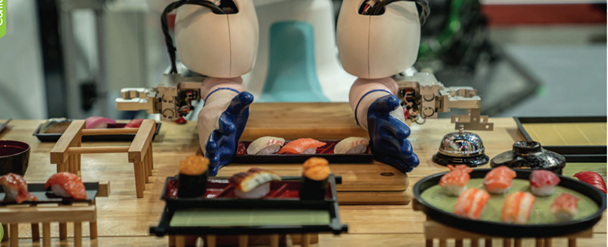
New Words - a
a. Match the underlined words to the definitions. Listen and repeat.
(Nối các từ được gạch chân với các định nghĩa. Lắng nghe và lặp lại.)
1. I don't like online customer service. I prefer talking to a human.
2. I like playing with my drone. I can control it with my smartphone.
3. Many years ago, people made all of their clothes by hand.
4. I'm too busy to cook, so I order food from a delivery service.
5. Families create a lot of waste, which is bad for the environment.
6. The coffee maker is automated. Just press the button and wait.
a. a person 1
b. have a machine do a person's job _______
c. tell a machine what to do _______
d. done by a person not a machine _______
e. materials that are thrown away _______
f. taking things to the people they have been sent to _______
New Words - b
b. In pairs: What chores at home do you do by hand? What things do machines and computers help people do?
(Theo cặp: Bạn thường làm những công việc gì ở nhà bằng tay? Máy móc, máy tính giúp con người làm những công việc gì?)
I wash the dishes by hand. (Tôi rửa bát đĩa bằng tay.)
Computers help delivery drivers find our homes. (Máy tính giúp tài xế giao hàng tìm thấy nhà của chúng tôi.)
Reading - a
a. Read the magazine interview. What effect will automation have on cities?
(Đọc bài phỏng vấn trên tạp chí. Tự động hóa sẽ có tác dụng gì đối với các thành phố?)
1. They will be less expensive and quieter. (Chúng sẽ ít tốn kém hơn và yên tĩnh hơn.)
2. They will be cleaner and safer. (Chúng sẽ sạch hơn và an toàn hơn.)
TEEN TECH SPOTLIGHT: AUTOMATED CITIES
Dr. Amanda Hall is a science and robotics expert. In this issue of Teen Tech Weekly, we're talking to her about automation. Read on to find out how it will improve life in the cities of the future.
What is automation? Automation is when machines and computers do things instead of humans. Some people think that this is something that will happen in the future. Actually, it's happening all the time. The washing machine is one of my favorite examples. Washing clothes by hand takes a lot of time. We save a lot of time and energy when we use a washing machine.
What will be automated in the next five years? Fast food restaurants are already being automated. You order your hamburger and a drink using a touchscreen menu at some places. I think that soon, the food will be prepared by robot chefs. Deliveries will be automated, too. We buy a lot of things online these days. They often arrive late, or at the wrong time of day. Sometimes, they even go to the wrong place! In a few years, everything will be delivered by drones. This will be faster. cheaper, and more reliable than sending human drivers.
What else will be automated in the cities of the future? I think that in the future, almost everything will be automated. Everyone will live in smart cities. Their home security will be controlled by a computer. Household waste will be recycled automatically. Even the streets will be kept clean by robots!
So, there you have it. Automation has already begun, and it will make our cities better places to live!
Reading - b
b. Now, read and answer the questions.
(Bây giờ, hãy đọc và trả lời các câu hỏi.)
1. The word it in paragraph 1 refers to ____________.
a. robot b. automation c. life
2. What example of automation helps people with the housework today?
_________________________________________
3. What might cook some of our meals in the future?
_________________________________________
4. What will deliver things to us in the future?
_________________________________________
5. What will keep our homes safe in the future?
_________________________________________
Reading - c
c. Listen and read.
(Nghe và đọc.)
TEEN TECH SPOTLIGHT: AUTOMATED CITIES
Dr. Amanda Hall is a science and robotics expert. In this issue of Teen Tech Weekly, we're talking to her about automation. Read on to find out how it will improve life in the cities of the future.
What is automation? Automation is when machines and computers do things instead of humans. Some people think that this is something that will happen in the future. Actually, it's happening all the time. The washing machine is one of my favorite examples. Washing clothes by hand takes a lot of time. We save a lot of time and energy when we use a washing machine.
What will be automated in the next five years? Fast food restaurants are already being automated. You order your hamburger and a drink using a touchscreen menu at some places. I think that soon, the food will be prepared by robot chefs. Deliveries will be automated, too. We buy a lot of things online these days. They often arrive late, or at the wrong time of day. Sometimes, they even go to the wrong place! In a few years, everything will be delivered by drones. This will be faster. cheaper, and more reliable than sending human drivers.
What else will be automated in the cities of the future? I think that in the future, almost everything will be automated. Everyone will live in smart cities. Their home security will be controlled by a computer. Household waste will be recycled automatically. Even the streets will be kept clean by robots!
So, there you have it. Automation has already begun, and it will make our cities better places to live!
Tạm dịch:
TEEN TECH SPOTLIGHT: THÀNH PHỐ TỰ ĐỘNG
Tiến sĩ Amanda Hall là một chuyên gia về khoa học và người máy. Trong số này của Teen Tech Weekly, chúng tôi đang nói chuyện với cô ấy về tự động hóa. Hãy đọc tiếp để tìm hiểu xem nó sẽ cải thiện cuộc sống ở các thành phố trong tương lai như thế nào.
Tự động hóa là gì? Tự động hóa là khi máy móc và máy tính làm mọi việc thay vì con người. Một số người cho rằng đây là điều sẽ xảy ra trong tương lai. Trên thực tế, nó đang xảy ra mọi lúc. Máy giặt là một trong những ví dụ yêu thích của tôi. Giặt quần áo bằng tay mất rất nhiều thời gian. Chúng ta tiết kiệm rất nhiều thời gian và năng lượng khi sử dụng máy giặt.
Điều gì sẽ được tự động hóa trong năm năm tới? Các nhà hàng thức ăn nhanh đã được tự động hóa. Bạn gọi bánh mì kẹp thịt và đồ uống bằng menu màn hình cảm ứng ở một số nơi. Tôi nghĩ rằng chẳng bao lâu nữa, thức ăn sẽ được chuẩn bị bởi các đầu bếp robot. Việc giao hàng cũng sẽ được tự động hóa. Chúng tôi mua rất nhiều thứ trực tuyến những ngày này. Họ thường đến muộn, hoặc không đúng thời điểm trong ngày. Đôi khi, họ thậm chí còn đi nhầm chỗ! Trong vài năm nữa, mọi thứ sẽ được vận chuyển bằng máy bay không người lái. Điều này sẽ nhanh hơn. rẻ hơn và đáng tin cậy hơn sau đó gửi trình điều khiển của con người.
Những gì khác sẽ được tự động hóa trong các thành phố của tương lai? Tôi nghĩ rằng trong tương lai, hầu hết mọi thứ sẽ được tự động hóa. Mọi người sẽ sống trong các thành phố thông minh. An ninh nhà của họ sẽ được kiểm soát bởi một máy tính. Rác thải sinh hoạt sẽ được tái chế tự động. Ngay cả đường phố cũng sẽ được robot giữ sạch sẽ!
Vì vậy, có bạn có nó. Quá trình tự động hóa đã bắt đầu và nó sẽ biến các thành phố của chúng ta thành nơi sinh sống tốt hơn!
Reading - d
d. In pairs: Do you think cities in the future will be good places to live? Why (not)?
(Làm theo cặp: Bạn có nghĩ rằng các thành phố trong tương lai sẽ là nơi tốt để sống không? Tại sao (không)?)
Grammar Meaning and Use - a
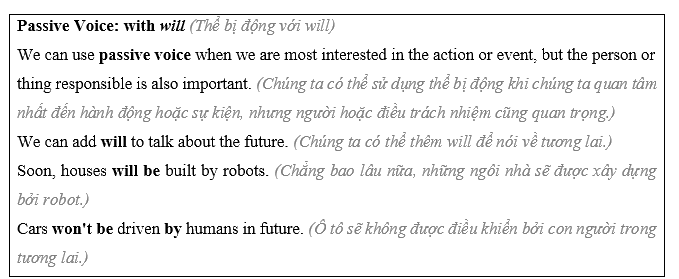
a. Look at the picture. What do you think the people are saying?
(Nhìn vào bức tranh. Bạn nghĩ mọi người đang nói gì?)

Grammar Meaning and Use - b
b. Now, listen and check your ideas.
(Bây giờ, hãy lắng nghe và kiểm tra ý tưởng của bạn.)
How will pizza be delivered in the future? (Pizza sẽ được giao trong tương lai như thế nào?)
In the future, pizza will be delivered by drones. (Trong tương lai, bánh pizza sẽ được giao bằng máy bay không người lái.)
Grammar Meaning and Use - c
c. Listen and repeat.
(Lắng nghe và lặp lại.)
How will pizza be delivered in the future? (Pizza sẽ được giao trong tương lai như thế nào?)
In the future, pizza will be delivered by drones. (Trong tương lai, bánh pizza sẽ được giao bằng máy bay không người lái.)
Grammar Form and Practice - a
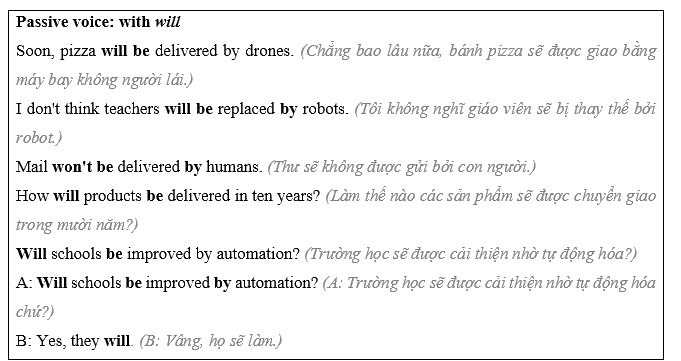
a. Fill in the blanks using Passive Voice with will.
(Điền vào chỗ trống bằng cách sử dụng Thể bị động với will.)
1. In a few years, meals in restaurants (cook) will be cooked by robots.
2. I think that many jobs (do) ____________ by machines.
3. In smart homes, waste (recycle) ______________ automatically.
4. How ____________ drones (control) _______________ in the future?
5. _______________ delivery services (automate) ______________soon?
6. Most vehicles (not drive) _____________ by humans.
Grammar Form and Practice - b
b. Write passive sentences about cities in the future using the information in the table.
(Viết câu bị động về các thành phố trong tương lai bằng cách sử dụng thông tin trong bảng.)
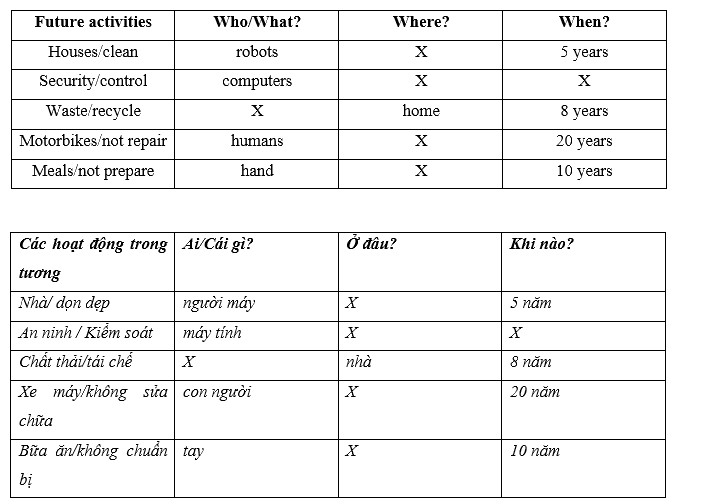
1. Houses will be cleaned by robots in five years.
2. ________________________________________
3. ________________________________________
4. ________________________________________
5. ________________________________________
Grammar Form and Practice - c
c. In pairs: Take turns using Passive Voice with will to make predictions about how your home or school will be different in the future.
(Theo cặp: Thay phiên nhau sử dụng Giọng nói bị động với will để đưa ra dự đoán về ngôi nhà hoặc trường học của bạn sẽ thay đổi như thế nào trong tương lai.)
How do you think our homes will be different in the future? (Bạn nghĩ ngôi nhà của chúng ta sẽ khác như thế nào trong tương lai?)
I think that our rooms will be cleaned by robots in about ten years. (Tôi nghĩ rằng các phòng của chúng tôi sẽ được dọn dẹp bởi robot trong khoảng mười năm nữa.)
Pronunciation - a

Pronunciation - b
b. Notice the sound changes of the underlined words.
(Lưu ý sự thay đổi âm thanh của các từ được gạch chân.)
Delivery services will be automated. (Dịch vụ giao hàng sẽ được tự động hóa.)
Pizza will be delivered by drones. (Pizza sẽ được giao bằng máy bay không người lái.)
Pronunciation - c
c. Listen and cross out the sentence with the wrong sound changes.
(Nghe và gạch bỏ câu thay đổi âm sai.)
Houses will be built by machines. (Những ngôi nhà sẽ được xây dựng bằng máy móc.)
Houses will be cleaned by robots.( Những ngôi nhà sẽ được dọn dẹp bởi robot.)
Pronunciation - d
d. Read the sentences with the correct sound changes to a partner.
(Đọc các câu với âm thanh chính xác thay đổi đối tác.)
Practice - a
a. Take turns asking for and making predictions using the prompts.
(Thay phiên nhau yêu cầu và đưa ra dự đoán bằng cách sử dụng lời nhắc.)
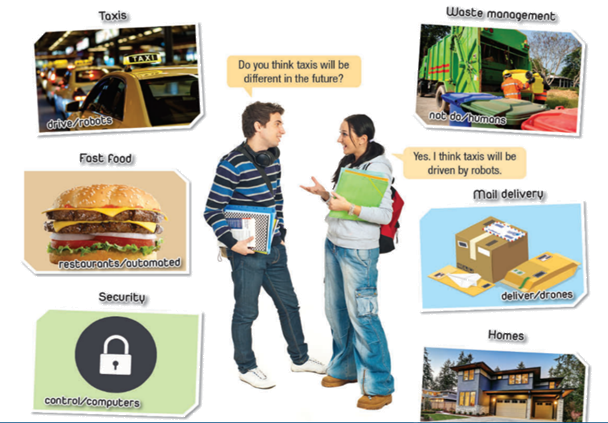
Practice - b
b. Practice with your own ideas.
Speaking - a
CITIES OF THE FUTURE: WHAT WILL CHANGE THE MOST?
a. You're choosing a topic for a school project. In pairs: Discuss your predictions about the future using the topics below. Choose the topic you and your partner think will change the most.
(Bạn đang chọn một chủ đề cho một dự án trường học. Theo cặp: Thảo luận về dự đoán của bạn về tương lai bằng cách sử dụng các chủ đề bên dưới. Chọn chủ đề mà bạn và đối tác của bạn nghĩ sẽ thay đổi nhiều nhất.)

Do you think transportation will be different in the future?
(Bạn có nghĩ rằng giao thông vận tải sẽ khác trong tương lai?)
Yes. I think in twenty years, trucks and buses will only be driven by robots.
(Đúng. Tôi nghĩ trong hai mươi năm nữa, xe tải và xe buýt sẽ chỉ được điều khiển bởi người máy.)
I agree. But I think that cars will still be driven by humans.
(Tôi đồng ý. Nhưng tôi nghĩ rằng ô tô vẫn sẽ do con người điều khiển.)
Speaking - b
b. Join another pair. Tell them which topic you think will change the most and why.
(Tham gia một cặp khác. Nói với họ chủ đề nào bạn nghĩ sẽ thay đổi nhiều nhất và tại sao.)
Mẹo tìm đáp án nhanh
Search Google: "từ khóa + baitap365" Ví dụ: "Bài 5 trang 13 SGK Vật lí 12 baitap365